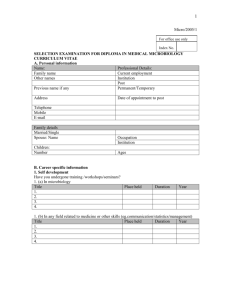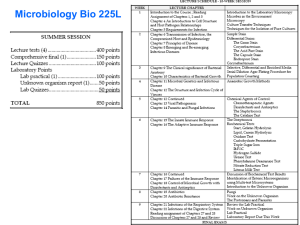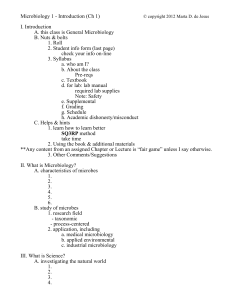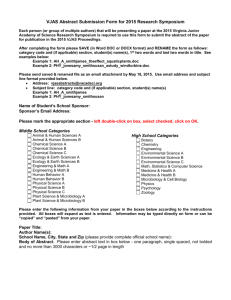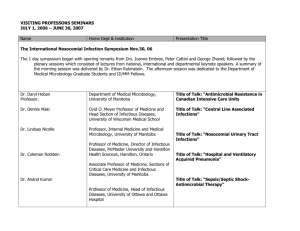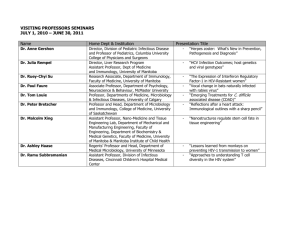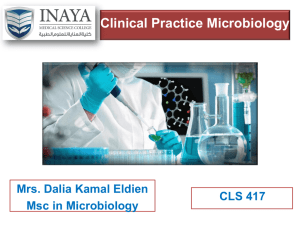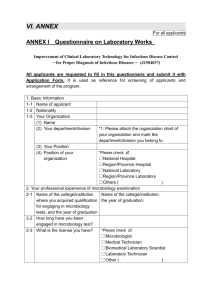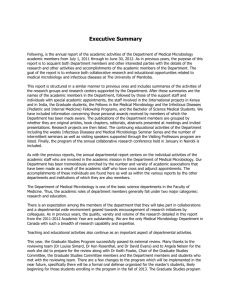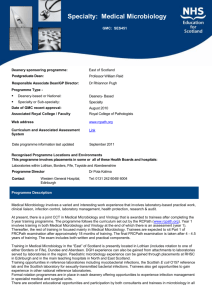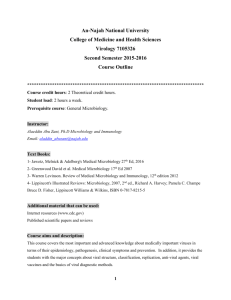II year of the Faculty of Medicine and Dentistry
advertisement
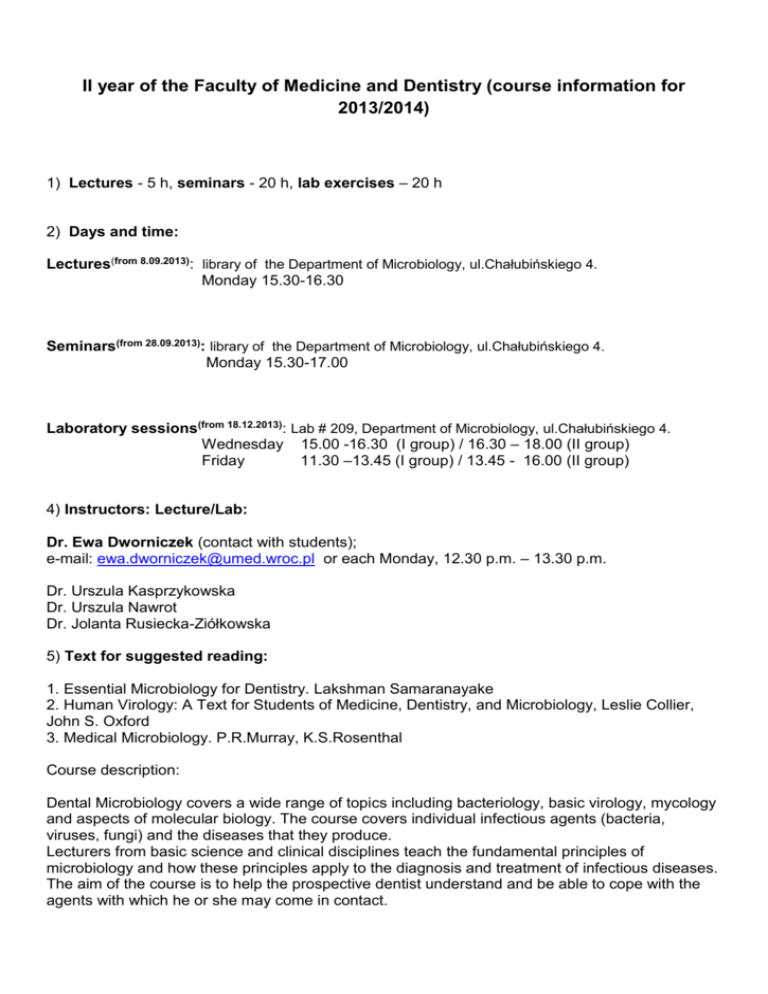
II year of the Faculty of Medicine and Dentistry (course information for 2013/2014) 1) Lectures - 5 h, seminars - 20 h, lab exercises – 20 h 2) Days and time: Lectures(from 8.09.2013): library of the Department of Microbiology, ul.Chałubińskiego 4. Monday 15.30-16.30 Seminars(from 28.09.2013): library of the Department of Microbiology, ul.Chałubińskiego 4. Monday 15.30-17.00 Laboratory sessions(from 18.12.2013): Lab # 209, Department of Microbiology, ul.Chałubińskiego 4. Wednesday 15.00 -16.30 (I group) / 16.30 – 18.00 (II group) Friday 11.30 –13.45 (I group) / 13.45 - 16.00 (II group) 4) Instructors: Lecture/Lab: Dr. Ewa Dworniczek (contact with students); e-mail: ewa.dworniczek@umed.wroc.pl or each Monday, 12.30 p.m. – 13.30 p.m. Dr. Urszula Kasprzykowska Dr. Urszula Nawrot Dr. Jolanta Rusiecka-Ziółkowska 5) Text for suggested reading: 1. Essential Microbiology for Dentistry. Lakshman Samaranayake 2. Human Virology: A Text for Students of Medicine, Dentistry, and Microbiology, Leslie Collier, John S. Oxford 3. Medical Microbiology. P.R.Murray, K.S.Rosenthal Course description: Dental Microbiology covers a wide range of topics including bacteriology, basic virology, mycology and aspects of molecular biology. The course covers individual infectious agents (bacteria, viruses, fungi) and the diseases that they produce. Lecturers from basic science and clinical disciplines teach the fundamental principles of microbiology and how these principles apply to the diagnosis and treatment of infectious diseases. The aim of the course is to help the prospective dentist understand and be able to cope with the agents with which he or she may come in contact. By the end of this course the student will have an appreciation of: 1. Overview of microorganisms- bacteria, viruses, fungi. 2. Microbial relationships (symbiosis, commensalism, parasitism); relationship: microorganismhumans; normal human microflora (oral flora, skin flora, intestinal and respiratory flora). 3. Overview of the biology, origin and epidemiology of the HIV virus, Hepatitis viruses, and other viruses infecting oral cavity. 4. Infectious diseases: toxic shock syndrom, streptococcal septic shock, scalded skin syndrome etc. 5.Overview of molecular and phenotypic typing techniques used in investigations of infectious diseases. 6.Overview of antibiotics and mechanisms of bacterial resistance to drugs. 7.Overview of fungal infections, oral canidiasis, candidiasis in immunocompromised and immunocompetent individuals. 6) Examination / grading policy: A .Two unit (class) examinations. Students will be required to answer 10 questions from lab units and lectures (associated with class topics) in 10 minutes, according to syllabus and the teacher directions. This is a single choice exam (students recognize a correct answer among a set of options that include 3-4 wrong answers). Lecture theory will be checked during class exams. The passing score is 60% of the positive answers. B. Each student will be required to take an active part in seminars and prepare presentations on a given topic. C. Final Examination will be accumulative and cover all material presented in the lecture, seminar and lab components of the course. Satisfactory grades: 5.0 / 4.0 or 3.0. Before the Final Examination all components of the labs must be passed satisfactory (min. 60%) 7) Attendence policy: Laboratory attendance is mandatory. During labs attendance checks will be made. You WILL NOT PASS the course if you miss more than 2 labs without a valid medical excuse. Arriving late (more than 15 minutes) or leaving early before the lab work is completed will be counted as an unexcused absence. Class will begin promptly at the disignated time. Examination conditions: Attendance for all exams is absolutely required. No make-up tests will be given unless the abscence is explained by a signed physician’s note indicating the reason for the abscence or prior permission from the instructor has been obtained. The explanation must be provided within 1 week after the missed exam. Failure to meet these criteria will result in an unsatisfactory score (0%) for the missed tests. Missed class exam must be made up before the next class exam. If they are not, the student will receive 0% for the missed exam and will not be allowed to write the next class exams. Student are expected to present professionalism and responsibility, to work well with partners and cooperate in class.

